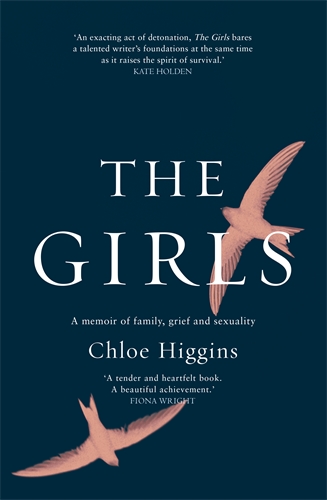There are books that have earnt the title of ‘classic’ when it comes to grief writing: Joan Didion’s The Year of Magical Thinking (2005) and Blue Nights (2011); Cory Taylor’s Dying: A Memoir (2016); Helen MacDonald’s H is for Hawk (2014) and Jenny Diski’s In Gratitude (2016) spring immediately to mind. These books are classics because they encompass or achieve something beyond simply describing loss. Although, having said that, a description of grief that rings true to the reader can be the most impactful, the most useful: acute grief is a brand of pain where words tend to fall away and a low howl takes its place. Perhaps that’s the most valuable thing these books lend us: words to describe the indescribable.
Now there is another book to add to the list of grief memoir classics: The Girls by Chloe Higgins. Higgins’ story begins fourteen years ago with a horrific car accident which her father survived but her two sisters, Carlie and Lisa – fourteen and nine years old at the time – did not. Her father, Maurice, was driving the girls home from their annual ski trip when the car veered onto the wrong side of the road, hit oncoming traffic, and the back carriage burst into flames. Chloe and her mother, Rhonda, stayed home that year. Riddled with grief and guilt and confusion, Chloe’s father still talks about the accident as ‘the day I killed my daughters.’
The Girls is about what happened after Carlie and Lisa died. It’s about the intervening fourteen years between their deaths and the publication of this book, which is Higgins’ first. The work of grieving and healing is not over for any of the surviving members of Chloe’s family: Maurice and Rhonda continue to struggle, and Chloe describes her own fragile mental health. What this memoir offers that the others do not is an intimate study of grief and sexuality.
Chloe was seventeen when her sisters died; she was studying for her university entrance exams the night of the crash. After the accident, Chloe tries to forget her trauma with a heady mixture of drugs and sex. She loses herself in order to lose her pain. A few years of escapist partying turns into a few more years of prostitution. Sex work offered Chloe control over her hours and days at a time when grief and anxiety made it impossible to hold down a ‘normal job’. I am not doing the book justice in this summary: Higgins’ observations about how grief works its way through the body are sharp. The reader can feel the healing at work (advancing a little, retreating, advancing again – the process is not linear) as they make their way through the book. Higgins delves into what worked (or seemed to work) then and what works now – meditation, exercise, solitude, writing – and not in a tawdry way.
This may not be the book for someone who has experienced a very recent loss. The Girls is raw and breathtaking in its honesty. It will leave a mark. It will remind the reader of the fragility of life and the extraordinary strength it takes to keep going after the unimaginable has happened – through the first few hours and all the hours after that.
Reviewed by Charlotte


